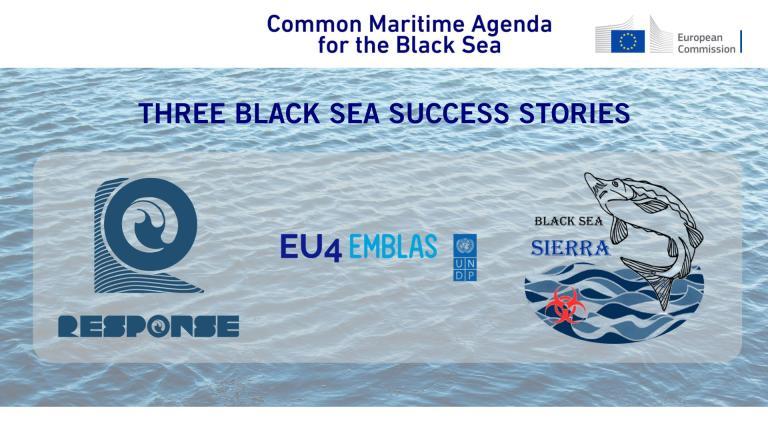Given the impacts of the ongoing war in Ukraine on the Black Sea sea-basin, marine environmental monitoring has become a critical and timely priority for the 2025 Ukrainian CMA Coordination. The urgency of addressing marine pollution requires enhanced monitoring systems and robust mitigation strategies. Coordinated regional efforts are essential to support green recovery, effective reconstruction, and long-term sustainable development in the region.
Cross-cutting projects tackling the Black Sea pollution
The EU-funded projects RESPONSE, EU4EMBLAS, and Black Sea Sierra, are three notable success stories making significant strides in safeguarding the Black Sea environment.
RESPONSE focuses on strengthening preparedness and response mechanisms through comprehensive training. It develops and tests free-access training schemes and curricula tailored to monitoring, reporting, managing, and mitigating marine pollution. RESPONSE follows a co-creation approach, ensuring that training programs align with stakeholders’ needs and societal requirements.
EU4EMBLAS addresses the lack of accurate, reliable, and comparable data on marine environment. It builds national capacities, raises public awareness and engagement in the Black Sea environmental issues. EU4EMBLAS implements data systems and facilities for environmental monitoring, conducts capacity building, scientific monitoring surveys, and promotes public awareness.
Black Sea Sierra aims to enhance and adapt decision-makers’ response capacity to current and emerging marine pollution through coordinated cross-border approaches. It provides updated assessments of marine pollutants through in situ sampling and laboratory analysis, a scientific-based handbook, complementary sustainable management plan, and training workshops and meetings to authorities and organisations involved in decision-making related to reaction and management of marine pollution.
These three projects bring together key stakeholders’ resources, knowledge and tools needed for effective data monitoring, including data coming from war impact. Additionally, these projects support the objectives of the CMA for the Black Sea, which calls for harmonised monitoring procedures, standards, and data analysis methodologies across the region. Furthermore, these projects contribute to the implementation of EU policies such as the Marine Strategy Framework Directive (MSFD) by promoting the integration of sustainability use and recovery of marine resources in the Black Sea.
Emerging environmental challenges
The Black Sea Sierra project has highlighted the importance of rapid emergency response and cleanup operations. By deploying sensor-equipped markers and specialised teams to contaminated "red zones", the project promotes tailored decontamination and restoration strategies to prevent pollutant dispersion and guide sustainable post-war reconstruction.
The RESPONSE project has identified war pollution as an urgent and emerging threat. In light of the ongoing conflict and environmental disasters such as the Kakhovka Dam collapse, RESPONSE has intensified monitoring efforts and integrated war-related environmental risks management into its training and assessments. Despite access limitations, the project has expanded its scope regionally, promoting adaptive response mechanisms and international cooperation.
Following the Kakhovka Dam disaster in June 2023, the EU4EMBLAS project swiftly mobilised to assess pollution impacts on the Black Sea. By comparing new data with pre-war baselines, the project quantified a substantial toxic release, including the spread of antibacterial-resistant genes. These findings underscore the need for long-term monitoring to fully understand ecological impacts and inform future recovery efforts.
Together, these projects underscore the growing urgency and collective commitment to protecting the Black Sea’s marine environment amid war-related pressures.
Strengthen cooperation for harmonised data availability
Each of these three success stories provides resources to address other crucial challenges such as restricted access to outdated data and limited stakeholder participation. Additionally, these projects are eager to collaborate and foster synergies towards a common vision, aligning with broader regional frameworks such as the EU’s Strategic Research and Innovation Agenda for the Black Sea (SRIA).
RESPONSE, EU4EMBLAS and Black Sea Sierra are extending their activities, enriching the data of marine monitoring, providing more training courses and materials, planning in situ sampling campaigns, and engaging local and regional stakeholders. They incorporate the most up-to-date information on marine data available in the Black Sea, which is disseminated through workshops and events, where they showcase results and explore further opportunities for joint development and exchange of expertise.
Ukraine’s CMA coordination efforts, along with the success stories presented, demonstrate that it is possible to establish a comprehensive cooperation for data collection and a common strategy for the preservation of the marine environment in the Black Sea.

